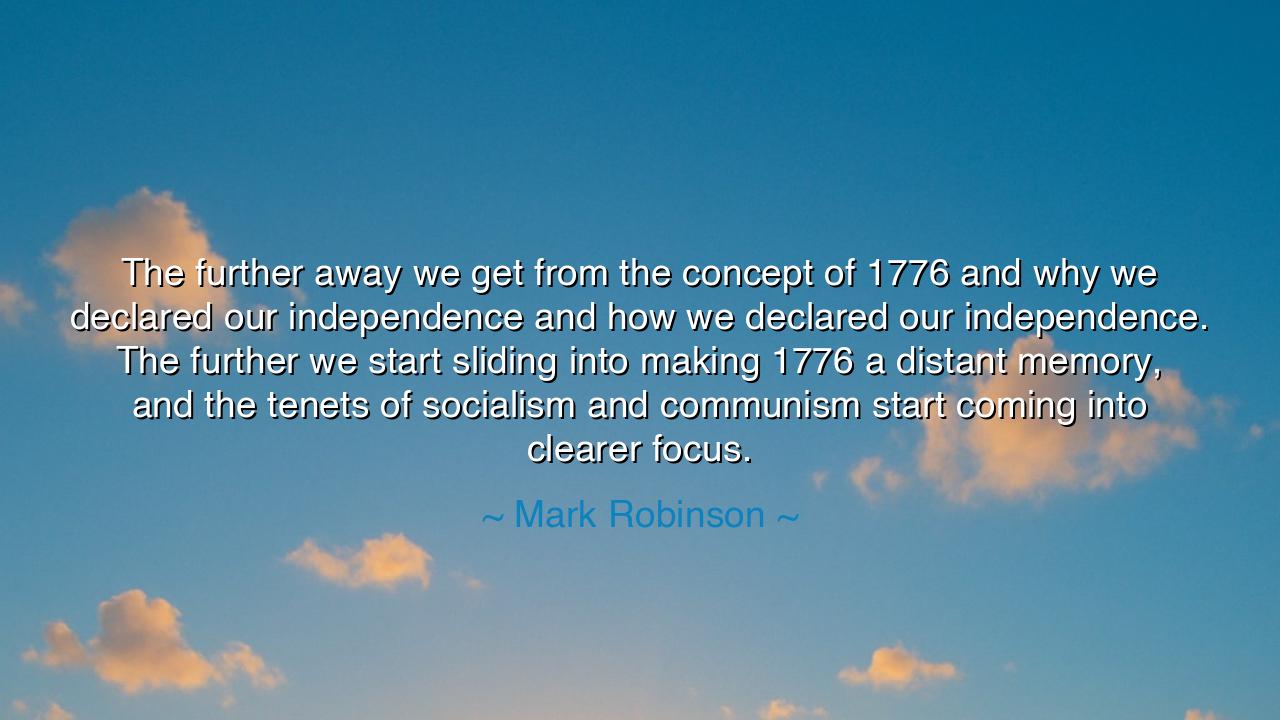
The further away we get from the concept of 1776 and why we
The further away we get from the concept of 1776 and why we declared our independence and how we declared our independence. The further we start sliding into making 1776 a distant memory, and the tenets of socialism and communism start coming into clearer focus.






"The further away we get from the concept of 1776 and why we declared our independence and how we declared our independence. The further we start sliding into making 1776 a distant memory, and the tenets of socialism and communism start coming into clearer focus." Thus spoke Mark Robinson, a man of conviction and faith, whose words are not merely a political warning, but a spiritual cry from the heart of a people who sense their foundation slipping. In this quote, Robinson calls upon the memory of 1776, not merely as a date upon parchment, but as the living symbol of human liberty—the birth of a nation built upon courage, faith, and the belief that men and women are endowed by their Creator with unalienable rights. He warns that as this memory fades, as we forget why freedom was born and how it was won, we invite its opposite—the slow encroachment of control, conformity, and servitude under new names.
The origin of this quote lies in Robinson’s reflections on the meaning of American independence, and the peril that comes when a nation loses touch with its own story. He speaks not as a scholar, but as a sentinel—one who guards the flame of memory against the winds of forgetfulness. For the spirit of 1776 was not a mere rebellion against taxation or monarchy; it was a revolt against tyranny in all its forms, a declaration that the human soul was made to stand upright, not kneel before masters. The Founders, in that sacred moment, proclaimed the eternal truth that government exists to serve man, not to rule him. Robinson fears that in our comfort and complacency, we have begun to exchange this truth for illusions of safety—forgetting that the chains of servitude are often forged by those who promise to protect us.
To understand his warning, we must first recall what 1776 truly represented. It was the year when ordinary men—farmers, tradesmen, scholars—risked everything against the mightiest empire on earth, armed not with wealth or weapons, but with conviction. The Declaration of Independence was not a cry of hate, but of hope. It was a statement that liberty, once claimed, must be guarded by every generation thereafter. Yet time, the great eroder, wears away the memory of struggle. The further a people drift from their founding principles, the easier it becomes for them to accept comfort in place of character, and control in place of freedom. This is the danger Robinson names—the slow forgetting of who we are and why we were free.
History itself bears witness to his fear. Look to ancient Rome, once a republic of citizens proud and free. In its early days, the Romans upheld the virtues of duty, independence, and shared sacrifice. But as generations passed, luxury replaced labor, and entitlement replaced effort. The people traded their civic voice for bread and spectacle—content to be entertained rather than empowered. In their forgetfulness, they surrendered their freedom to emperors who promised order. Thus the Roman Republic, born of liberty, died of apathy. Robinson’s words echo this eternal pattern: when people forget the price of freedom, they soon pay the cost of losing it.
The tenets of socialism and communism that Robinson warns of are not merely political systems, but mindsets—the belief that freedom should yield to authority, that the individual must dissolve into the collective, and that equality of outcome is worth more than equality of opportunity. These ideas, though clothed in the language of compassion, demand submission rather than sovereignty. When people forget that liberty requires responsibility, they become willing to let others think, work, and decide for them. Robinson’s cry is not against compassion, but against control disguised as kindness—a subtle tyranny that grows when the memory of independence fades.
He speaks as one who knows that freedom is not inherited—it is learned, lived, and renewed. The founding of 1776 was not only a victory of arms but of ideals. The Declaration, the Constitution, the Bill of Rights—these were not relics for museums but compasses for the soul of a nation. To drift from them is to lose one’s direction. The further we slide from their wisdom, the more we open the door to those who promise a new world, only to build it upon the ruins of the old. For no civilization falls in a single night; it collapses slowly, as its people forget to remember.
So, my children of liberty and remembrance, take this teaching as a charge: remember your beginnings. Learn again what 1776 meant and means. Teach your children not merely the names of heroes, but the principles for which they lived and died—freedom, self-reliance, courage, and faith in the dignity of the individual. Speak often of them, live them, and guard them fiercely. For no power, foreign or domestic, can destroy a people who still remember what it means to be free.
And let Mark Robinson’s words echo in your hearts: “The further away we get from the concept of 1776, the further we start sliding into making 1776 a distant memory.” To remember is to resist, to honor is to preserve. The light of freedom must not be allowed to dim. Let each generation raise it anew, as their forefathers once did beneath the stars of revolution, and say again with unshakable faith—we hold these truths to be self-evident. For when the memory of liberty lives within us, no power on earth can enslave us.






AAdministratorAdministrator
Welcome, honored guests. Please leave a comment, we will respond soon